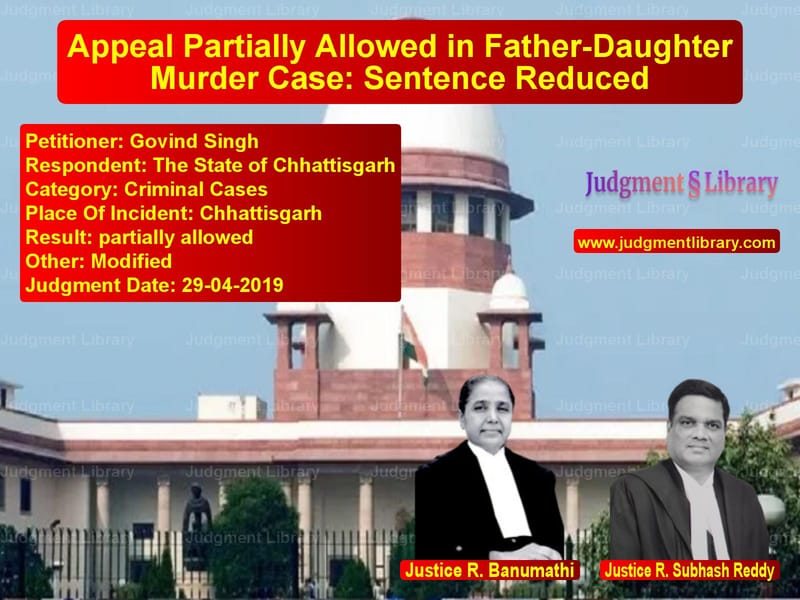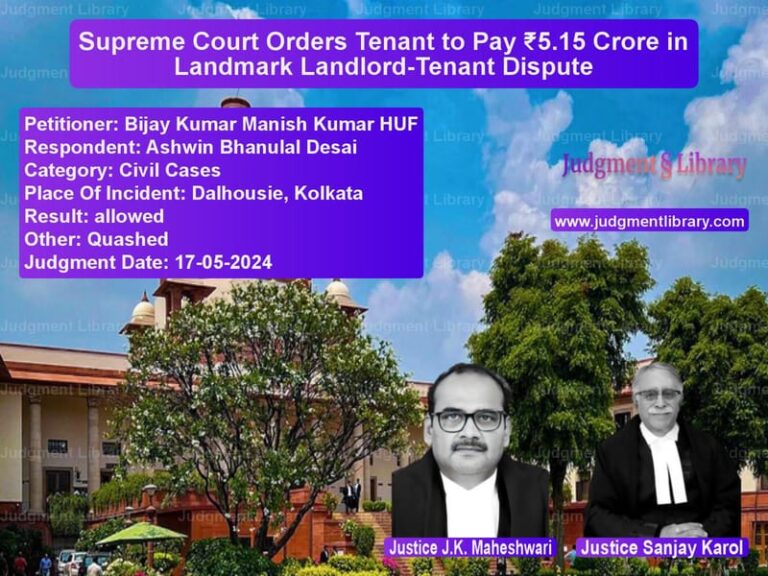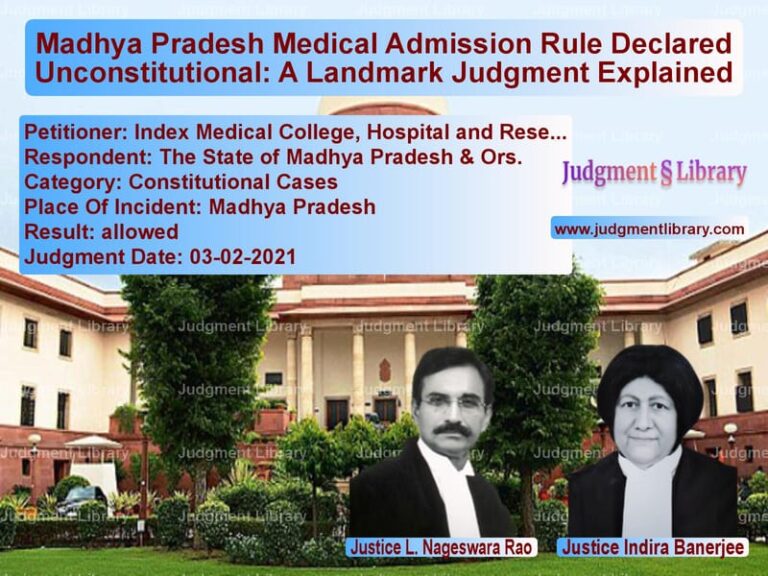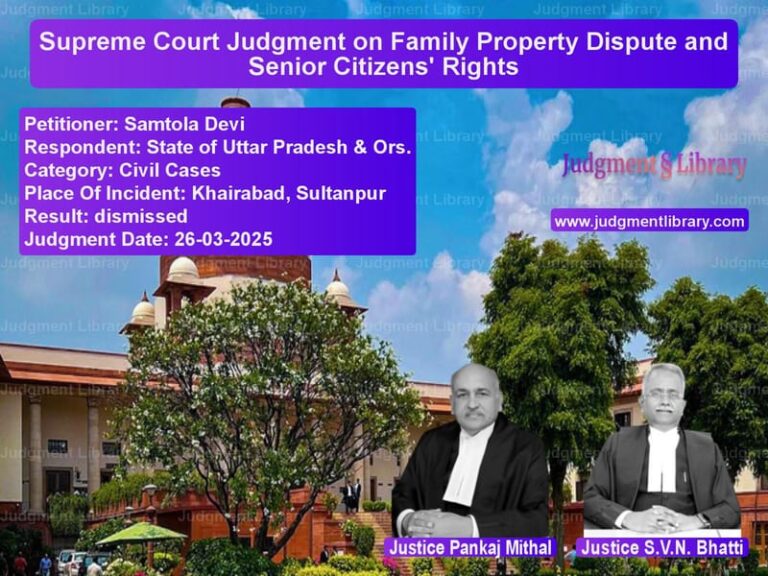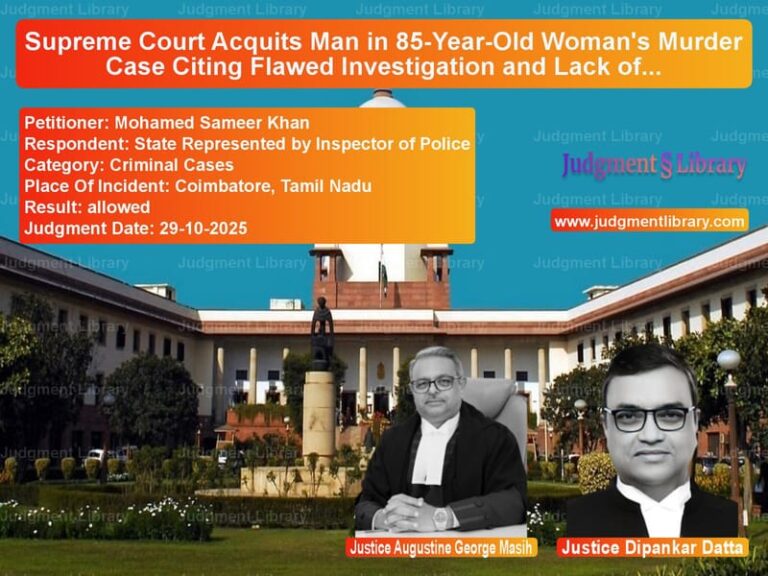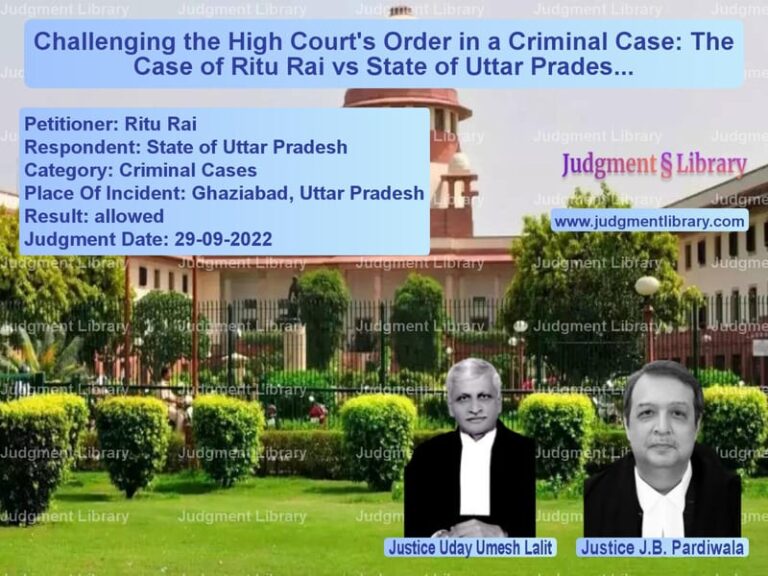Appeal Partially Allowed in Father-Daughter Murder Case: Sentence Reduced
This case involves an unfortunate incident where a father, Govind Singh, was convicted for the murder of his daughter, Lalita. The incident occurred on the evening of 23rd May 2007 when, in the midst of a heated argument over a household issue, the appellant threw a burning chimney lamp on his daughter, causing severe burn injuries. The case initially charged the appellant under Section 302 of the Indian Penal Code (IPC), and after extensive trials, both the trial court and the High Court affirmed his conviction for murder. However, the Supreme Court, upon reviewing the case, modified the conviction and reduced the sentence, providing the appellant relief based on the nature of the offence.
Background of the Case
The prosecution’s case rests on the fact that Lalita, the deceased, was sitting with her friend, Dev Kumari (PW-1), when her father, Govind Singh, entered the room. He wanted to remove the bulb from the room to connect it outside, which led to a verbal disagreement. The situation escalated quickly, and in a fit of rage, Govind Singh threw a burning chimney lamp on his daughter, which resulted in severe burn injuries. Lalita’s mother and other villagers tried to extinguish the fire, but despite medical attention, she succumbed to her injuries a few days later, on 30th May 2007.
Initially, the case was registered under Section 307 of the IPC (attempted murder) but was later changed to Section 302 after Lalita’s death. The appellant was convicted under Section 302 IPC, and the High Court upheld the sentence of life imprisonment. However, the appellant filed an appeal in the Supreme Court, questioning both the conviction and the severity of the punishment.
Key Arguments of the Parties
Appellant’s Arguments
- The appellant’s counsel argued that the incident occurred in a sudden quarrel, and the act was not premeditated. The appellant had no intention of killing his daughter; it was a spur-of-the-moment action, and the use of a burning chimney lamp was unintentional. Therefore, the appellant should not be convicted under Section 302 IPC, as the act did not amount to murder but rather to a case of culpable homicide under Section 304, Part II of the IPC.
- Additionally, the appellant’s counsel contended that the period of imprisonment already served by the appellant, which was around 10 years and 2 months at the time of the appeal, should be considered in reducing the sentence.
Respondent’s (State’s) Arguments
- The prosecution argued that the appellant’s actions were deliberate and intentional. The prosecution claimed that throwing a burning lamp on the deceased in a fit of rage constituted an act of murder under Section 302 IPC. The High Court had rightfully upheld the conviction based on the facts of the case.
- The prosecution maintained that the appellant’s conduct in the heat of the moment should not excuse his actions, which led to the death of his daughter. The conviction and the sentence of life imprisonment were, therefore, appropriate, and the appeal should be dismissed.
Supreme Court’s Analysis
The Supreme Court closely examined the circumstances of the case, particularly the nature of the quarrel and the sudden escalation of events. The Court agreed that while the appellant’s actions were extremely reckless and resulted in the tragic death of his daughter, there was no premeditation involved. The Court noted that the act of throwing the burning lamp was done in the heat of the moment during a verbal dispute, and such acts, though causing severe harm, may not necessarily fall under the category of murder.
In line with this, the Supreme Court invoked Exception 4 to Section 300 of the IPC, which deals with the killing of a person in the heat of passion upon a sudden quarrel. The Court acknowledged that the act was impulsive and unplanned and, therefore, decided to modify the conviction from Section 302 (murder) to Section 304, Part II (culpable homicide not amounting to murder).
Furthermore, the Court took into account the appellant’s long period of imprisonment already served. Given the nature of the offence and the circumstances under which it occurred, the Court found it appropriate to reduce the sentence. The appellant had already spent more than 10 years in prison, and considering the facts, the Court decided to modify the sentence to the period already undergone.
Judgment
The Supreme Court partly allowed the appeal with the following modifications:
- The conviction of the appellant under Section 302 IPC (murder) was modified to Section 304, Part II IPC (culpable homicide not amounting to murder).
- The sentence of life imprisonment was reduced to the period already undergone by the appellant, which was around 11 years and 8 months by the time the decision was rendered.
- The appellant was ordered to be released forthwith unless required in any other case.
Conclusion
The Supreme Court’s judgment in this case reflects a nuanced understanding of criminal intent and the impact of sudden quarrels in violent incidents. The Court recognized the difference between a premeditated act of murder and an impulsive, heated action that leads to a tragic outcome. By modifying the conviction and reducing the sentence, the Court sought to balance the need for justice with the recognition of the circumstances under which the crime was committed.
The case also highlights the importance of considering the duration of imprisonment already served when determining the final sentence, especially when the accused has been incarcerated for an extended period before the appeal.
Petitioner Name: Govind Singh.Respondent Name: The State of Chhattisgarh.Judgment By: Justice R. Banumathi, Justice R. Subhash Reddy.Place Of Incident: Chhattisgarh.Judgment Date: 29-04-2019.
Don’t miss out on the full details! Download the complete judgment in PDF format below and gain valuable insights instantly!
Download Judgment: Govind Singh vs The State of Chhatti Supreme Court of India Judgment Dated 29-04-2019.pdf
Direct Downlaod Judgment: Direct downlaod this Judgment
See all petitions in Murder Cases
See all petitions in Attempt to Murder Cases
See all petitions in Judgment by R. Banumathi
See all petitions in Judgment by R. Subhash Reddy
See all petitions in partially allowed
See all petitions in Modified
See all petitions in supreme court of India judgments April 2019
See all petitions in 2019 judgments
See all posts in Criminal Cases Category
See all allowed petitions in Criminal Cases Category
See all Dismissed petitions in Criminal Cases Category
See all partially allowed petitions in Criminal Cases Category

